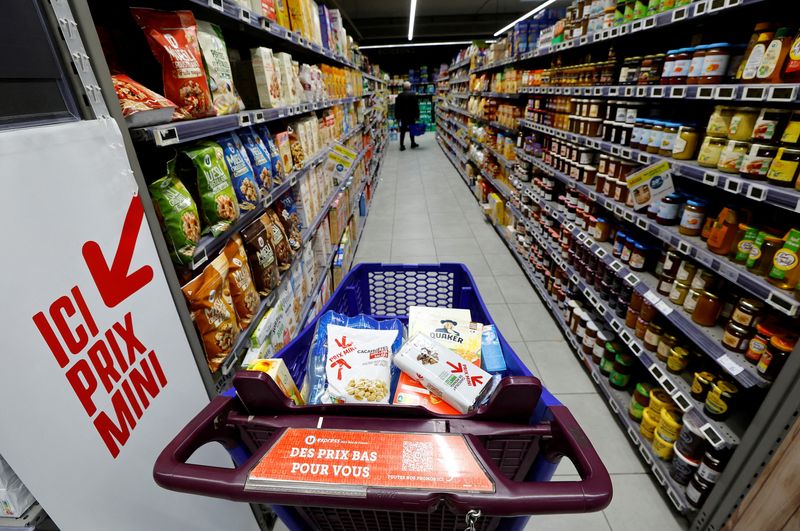By Francesco Canepa
FRANKFURT (Reuters) -Inflation in the euro zone dropped by the most on record in March but "core" price growth accelerated, which is likely to strengthen the case for more interest rate hikes by the European Central Bank.
After a record streak of rate rises, the ECB has refrained from committing to more, saying this will depend on whether the current turmoil in the banking sector subsides and on data including underlying inflation, which excludes volatile prices such as food and energy.
Data released on Friday showed underlying inflation rose to a new record high this month even as the broader headline figure fell sharply and consumers started to turn more cautious.
"The pressure on the ECB to continue raising interest rates remains high," Commerzbank (ETR:CBKG) economist Christoph Weil said.
Consumer prices in the euro zone rose by 6.9% in March after an 8.5% increase in February, implying the biggest drop since Eurostat started collecting data in 1991.
But the fall was almost exclusively due to lower energy prices compared to March last year, when they had surged in the wake of Russia's invasion of Ukraine.
A measure that excludes energy and food prices, known by economists as core inflation and seen as a better gauge of the underlying trend, meanwhile accelerated to a new all-time high of 7.5% from 7.4% in February.
Analysts polled by Reuters had expected headline inflation in the 20 countries that share the euro to come in at 7.1% and core inflation at 7.5%.
CONSUMERS FEELING THE PINCH
However, data on Friday from the euro zone's two biggest economies pointed to a softening in consumers' ability to spend - ultimately the main driver of price growth.
French consumer spending unexpectedly fell in February, as did German retail sales, while a European Commision survey published a day earlier showed households want to save more.
German import prices also registered their smallest increase in two years in February as energy prices eased.
"That is, all else equal, disinflationary and it argues that the ECB doesn’t have to do much more," Dirk Schumacher, an economist at Natixis, said.
Money-market prices show investors expect a 25-basis-point rate hike by the ECB at its next meeting on May 6, followed by another one or possibly two of the same size over the summer.
Strengthening the case for more tightening, euro zone unemployment remained stubbornly low at 6.6%.
This is a concern for policymakers who fear it could give workers greater bargaining power in salary negotiations and lead to higher wage increases that could perpetuate high inflation.
"This sediment of inflation will not be flushed out for two or three years, and will require further moderate interest rate increases by central banks, regardless of the current banking stress," Ulrich Kater, an economist at German bank Deka, said.
Several ECB policymakers including chief economist Philip Lane have also said recently that more increases in borrowing costs are likely needed to bring inflation back to the central bank's 2% target.
